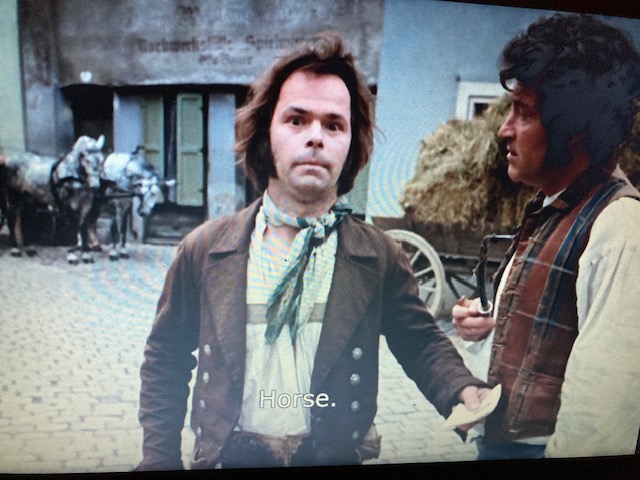Warning: contains spoilers.
Having just re-watched Werner Herzog's 1971 film, The Enigma of Kaspar Hauser, for the first time in over twenty years, I am reminded why I have always maintained such a fondness for this slow moving and strangely haunting film. Loosely based on a true story, the film centres around Kaspar Hauser, a young man who has been kept locked in a tower for his entire life, until he is suddenly taught a few words, instructed how to stand up and walk, and then released into the world by an unknown man, with only a strange letter of description in his hand that can be read by whomever he happens to come across.
It is an unsettling film, and for much of the story it is obvious that Kaspar (superbly played by Bruno. S, a travelling musician that Herzog discovered and who, as well as never having acted before, had also spent episodes of his life in mental institutions) has more in common with the animals who are also tied up and sleep on straw, than any of the human beings he comes to interact with. After Kaspar attempts to flee from performing in a circus (in order to "pay his way," you understand) he is taken up by a kindly man from the middle-class, and he and his family (staff) try very patiently to teach him the ways of society. But Kaspar finds he simply cannot find his place in this utterly odd, bizarre world.
He is questioned relentlessly by religious folk, but he has the innocent wisdom of a child, and he is scolded when he responds to their enquiries and demands.
Later in the film, Kaspar is assaulted, it appears by the man who had released him from the tower, possibly his own father, and then towards the end of the film, stabbed and killed by the same man. It is an unfathomable and enigmatic ending to a very strange film. There are moments of genuine beauty and sadness, but what struck me on this watching was just how comical it also is. The early scenes where Kaspar is being taught to walk and speak are very humorous. And when he is learning to speak, his lack of knowledge of language gives the dialogue a distinctly surrealistic feel, such as when Kaspar continually blurts out the word "Horse!" at completely inopportune moments, and answers in the way he does because he hasn't remotely understood what was being asked:
It brings instantly to mind the strange feeling and understanding of dream conversations.
The music in the film also emphasises the mood, and from the very first opening bars of Johann Pachelbel's Canon in D Major, we know we are in for an emotional couple of hours, as the narrator of the film, over this sweeping, dramatic music, asks the viewer:
Kaspar learns to love music, and his conversation about his failure to be able to play the piano tugs resolutely at the heart strings...
In a later scene, Kaspar also flies from church because of the resolutely unmusical noise of the congregation...
I understand Kaspar only too well in this painful scene, as that is how I feel when Oasis or The Stone Roses are within hearing distance of my sensitive ears!
The other thing that really struck me whilst viewing the film this time around was the heavy influence of the German Romantic painter, Casper David Friedrich (1774-1840). Friedrich painted extremely haunting pictures of nature, along with portraits showing humans often isolated against the sublime elements. Herzog clearly has these pictures in mind with some of the scenes in Kaspar Hauser.
And, finally, what a brilliant and emotional watch The Enigma of Kaspar Hauser is. It shows us just how artificial and absurd many human beliefs and interactions actually are, as the innocent and naïve Kaspar illustrates in his failure to comprehend some of the very basic religious and philosophical ideologies and beliefs that our society has agreed to rely on and accept as truth. Kaspar is suspiciously viewed as the animal or barbarian by the townsfolk he engages with, but he is gentle and kind, while they are the ones who tease him and try to make him perform mental gymnastics so they can instil their way of seeing the world onto him. Kaspar Hauser could almost be read as a symbol of all outsiders who can't find a place in this world and who see through the lies and machinations that are the oil that turns the wheel of our hypocritical, late-capitalist society. In this regard, he also put me in mind of Prince Myshkin in Dostoevsky's novel The Idiot, another naïve character who finds himself thrust into the everyday theatre of human affairs, and who ends badly. Indeed, Kaspar has more connection with, and is closer to, the poor animals who are tied up, housed in stables of straw, and generally reduced to the status of non-sentient things, which is how humanity treats the vast majority of non-human life forms it interacts with. There is a beautiful moment in the film that captures Kaspar's close affinity to the animal world in a scene where he is attempting to feed a small chick, and is delighted when it finally takes some of the food he is offering from a stick. Kaspar makes a childlike sound of genuine delight when this happens, and this treasured moment highlights Kaspar's humanity with genuine poignancy.
A beautiful, haunting and thought-provoking film.
xxxx


























No comments:
Post a Comment